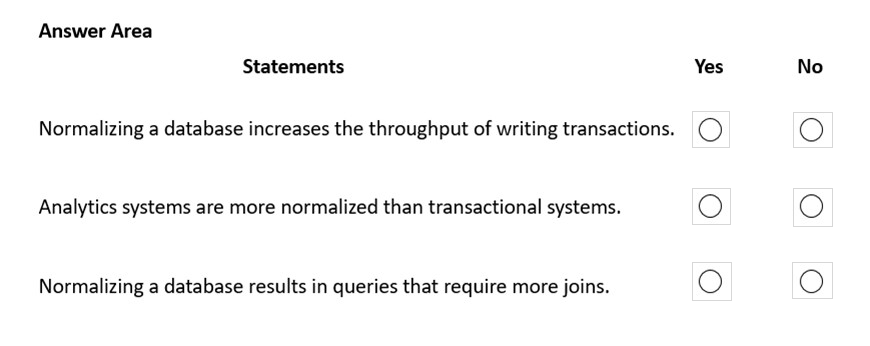HOTSPOT -
For each of the following statements, select Yes if the statement is true. Otherwise, select No.
NOTE: Each correct selection is worth one point.
Hot Area:

HOTSPOT -
For each of the following statements, select Yes if the statement is true. Otherwise, select No.
NOTE: Each correct selection is worth one point.
Hot Area:


Box 1: No -
Database normalization is the process of restructuring a relational database in accordance with a series of so-called normal forms in order to reduce data redundancy and improve data integrity.
Full normalisation will generally not improve performance, in fact it can often make it worse but it will keep your data duplicate free.
Box 2: No -
Analytics systems are deformalized to increase performance.
Transactional database systems are normalized to increase data consistency.
Box 3: Yes -
Transactional database systems are more normalized and requires more joins.
Reference:
https://www.sqlshack.com/what-is-database-normalization-in-sql-server
YES, NO, YES Normalizing decreases throughput for reading (need to make joins), but increases for writing (Less to write, since there are no duplicates)
Agree. Less Write means better performance. Yes, No, Yes is the right answer.
But, any foreign key constraint may slow down the throughput of the write operation.
A foreign key is a direct reference, so no. Having to go through all data takes more time. I agree with Kris_ETL
Agreed
NO NO YES Answers are correct Normalizing a Database increases the throughput for reading but reduces for writing. A normalized database is advantageous when operations are write-intensive or ACID compliance is required. Some advantages include: Updates run quickly due to no data being duplicated in multiple locations. Inserts run quickly since there is only a single insertion point for a piece of data, and no duplication is required. Tables are typically smaller than the tables found in non-normalized databases. This usually allows the tables to fit into the buffer, thus offering faster performance. Data integrity and consistency are an absolute must if the database must be ACID compliant. A normalized database helps immensely with such an undertaking.
The first one is a YES. Your answer contradicts what you develop later. Source: https://dzone.com/articles/pros-and-cons-of-database-normalization
Take it from a DBA with over 20+ years of work experience: Yes: Normalized systems are optimized for WRITE ops; much less so for READ ops (due to join operation btw different tables). No: Analytic systems are less normalized; they have more AGGREGATE data. Yes: Queries on normalized tables require more TABLE JOINS (full, inner, left, right... joins)
NO NO YES CORRECT ONE
ChatGPT: N/Y/Y
Normalizing a database increases the throughput of writing transactions. --> No. Analytics systems are more normalized than transactional systems. --> No. Normalizing a database results in queries that require more joins. --> Yes.
I think the first should be No as Normalizing a database typically improves data integrity and reduces data redundancy but can sometimes lead to a slight decrease in write transaction throughput. This is because, in a normalized database, data is distributed across multiple tables, and writing transactions may require inserting or updating records in multiple tables, which can add some overhead compared to denormalized databases. However, the trade-off is improved data consistency and easier maintenance. Second - No Third - Yes
Yes-No-Yes. Writing is optimized for normalized databases
No, No, Yes
as per my understanding: N | N | Y (Given answer is correct)
yny or nny?
NO, NO, YES
Yes, No, Yes
1 > False. Normalizing a database generally involves organizing the data to reduce redundancy and improve data integrity. While this can make read operations more efficient by minimizing data duplhttps://www.examtopics.com/exams/microsoft/dp-900/view/11/#ication and ensuring consistency, it often has the opposite effect on write operations.
SÌ, NO, SÌ
According to Chatgpt: Normalized databases are typically better optimized for write operations (INSERT, UPDATE, DELETE) rather than read operations. The normalization process involves organizing data to minimize redundancy and dependency, which can improve data integrity but may lead to more complex query structures for certain read operations.
Correct Answer